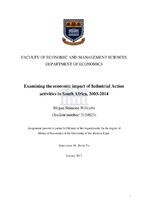| dc.description.abstract | Workers' right to strike is embedded in the South African Constitution and this right generally reflects a sign of fairness. Strike activities form a vital part of collective bargaining and the supremacy liaison between employers and employees would be severely ruined if workers are not entitled the right to strike. Ever since the right to strike was documented in the South African Constitution, strike actions have been a collective occurrence in the country. Reasons for strikes in South Africa are multi-layered and their effects are harmfully disastrous. Workers are on strikes due to various reasons such as low pay, inequality, and unemployment as a result of union conflicts and the inequitable degree of labour relations. However, strikes would lead to various problems in the economy, such as reduced production, scaring off investors, labour replaced by capital, etc. This study first defines the various key concepts relating to industrial action, before reviewing the theories on strikes as well as the results of past local and empirical studies. The study moves on to use the Department of Labour's 2003-2014 Industrial Action Report data to provide descriptive statistics on strike activities in 1999-2014 by broad industry categories (examining the number of strikes, work hours lost, work days lost, time-loss ratios, principle causes of strikes, most active trade unions involved in strikes), before using a static approach to estimate the value of total production foregone as well as the value foregone as a proportion of gross value added (GVA) by industry in each year as a result of strikes. Finally, the older 1970-1998 strikes data from the International Labour Organization (ILO) is ‘merged’ with the abovementioned 1999-2014 data, to examine the econometric relationship between strikes and business cycles, and it is found that strikes are procyclical. | en_US |

